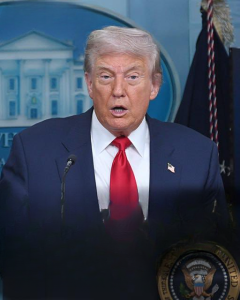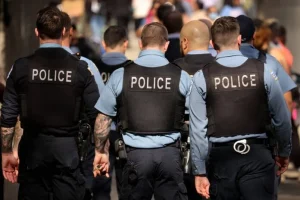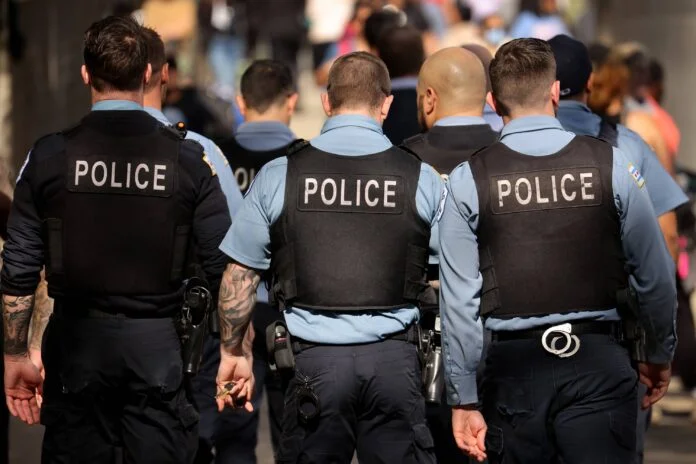A wide-ranging and controversial federal intrusion into Washington, D.C.’s law enforcement scene has caused a lot of trouble, both in the city and across the country. People in the city, lawyers, civil rights advocates, and regular people are all anxious about the president’s statement that the federal government will take over the Metropolitan Police Department (MPD) for 30 days. A lot of them worry that the idea goes too far with executive power and could disturb the fragile balance between federal and municipal government.
The president indicated at a press conference on Monday that he was taking control and that the capital needed a bolder, more robust response to crime and civil unrest. The proposal says that 800 National Guard personnel will collaborate with federal law enforcement and the MPD to keep an eye on the streets of Washington, D.C. A number of individuals disagreed with the president’s order to immediately remove homeless persons from all public places. He added that his actions were part of a plan to “bring back the city’s beauty and dignity.”
The president’s views about policing and city government were different from what they had said before. The president remarked, “No more Mr. Nice Guy,” which implied that being nice, following the rules, and letting the community police itself hadn’t done enough to make people feel safe. He stated that residents in the city felt that the politicians had left them behind and promised to bring back what he called “real law and order.”

But critics swiftly pointed out a major difference between what the administration asserted and what the crime data showed. Earlier this summer, the city released figures that showed violent crime is at its lowest level in almost 25 years. There are fewer homicides, assaults, and armed robberies happening. Also, property crimes and other nonviolent crimes have gone down, which goes against the assumption that the city is in turmoil. Community leaders alleged that the government made up a story about chaos to explain why it needed to use so much federal force.
The outrage grew when the president informed reporters that federal police would be authorized to “do whatever they want” if they confronted with resistance or violence. Lawyers and groups who work for human rights saw this as a sign that the police would use too much force, which could make civil rights protections weaker. A lot of individuals were anxious about how vague and open-ended the directive was because they feared it may lead to abuses of power that weren’t being scrutinized, especially in groups who have been over-policed and watched in the past.
Democrat Mayor Muriel Bowser, who has regularly disagreed with federal officials about who has power and who doesn’t, called the move “unsettling and unprecedented.” She had an emotional press conference in which she talked about how the District of Columbia has had a hard time with the federal government in the past. But the federal government taking over the District’s police department completely is something that hasn’t happened in a long time. She said that the administration had not asked her office for advice ahead of time and accused them of ignoring both the law and democratic processes.

Bowser also warned that sending in military and federal agents could make it tougher for residents to trust the police, which is already a hard thing to do. D.C. has spent money on community policing initiatives, diversion programs for nonviolent offenders, and social services that try to get to the bottom of crime in the last ten years. Local officials are anxious that a significant military presence could reverse the progress that has been made and make people feel less safe instead than more safe.
Two civil rights groups, the ACLU and the NAACP Legal Defense Fund, spoke out against the decision, saying it was authoritarian and maybe even against the law. People who support the unhoused were upset by the forced evacuations from public spaces. They called them a “cruel and punitive” way to deal with a housing crisis that has been going on for a long time and hasn’t been solved. Many people think that the government cared more about how things looked than about people’s dignity.
People are already looking at the legal reasons for the takeover. People are trying to use the law to stop the National Guard from coming to the District without the mayor’s permission. The lawsuits will probably use legal arguments from a case that happened in California before. In that case, the federal government sent Guard troops to Los Angeles to cope with massive protests against immigration, even though the governor didn’t want them there. The occurrence sparked a constitutional battle over how far the federal government can go when sending troops to the U.S. State officials argue these actions go against the Tenth Amendment and the principles of federalism.
The administration’s lawyers claim that the Insurrection Act and other emergency laws provide them ample legal ability to step in in both Los Angeles and Washington, D.C. But experts say that these kinds of regulations aren’t very clear and aren’t often tested in court, especially when there isn’t a declared emergency or state of insurrection. Some people think that the government is using unclear legal areas to give the president additional power in ways that could have long-lasting implications.
Those who agree with what the president is doing say that the federal government is doing what local authorities couldn’t do. Some conservative bloggers and MPs praised the administration for being willing to take “tough action” in response to what they see as the decline of cities and the lack of progress in politics. They argue that the National Guard will reduce crime, restore order, and make people and businesses feel safe again.
A lot of people who want stronger enforcement, on the other hand, don’t like the current precedent. People who don’t like the idea say that if the federal government can take over a city’s police department and send troops without the city’s approval, what stops them from doing the same thing in other cities where they don’t like the way things are done? What safeguards are in place to stop abuse? The whole country, not just Washington, D.C., is struggling with these issues right now.
The capital of the United States is now a high-stakes test of how the federal government and local governments work together, how to keep people safe, and how to follow the Constitution. This is happening during the 30-day control period. People are becoming used to a new, tense normal where streets are closely monitored, police are more visible, and there is a growing sense of ambiguity about what the government can and can’t do. Based on what happens in the following few weeks and the legal, political, and civic ramifications that follows, people will probably see this intervention as either a necessary correction or a dangerous overstep.
